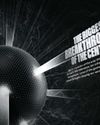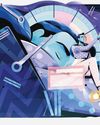
Rats are on the move. While there have been restrictions on humans during lockdown, the same cannot be said for rats. There is increasing evidence that the COVID-19 pandemic has resulted in a radical shake-up of rodent society.
Within weeks of the first lockdown in March 2020, around 50 per cent of pest controllers across the UK were reporting increased signs of rat activity when out on a job, according to a survey conducted by the British Pest Control Association (BPCA). By October, the situation had got even worse, with almost 80 per cent of BPCA members observing an increase in rat activity.
Why would this be? “Rats benefit and thrive from the things that we do,” says Natalie Bungay, the BPCA’s technical and compliance officer. Rubbish sacks stacked on the pavement or half-eaten takeaways tossed into a bin are a handout for rats. “They need about 200g of food a day and as long as they can find that they’ll be fine,” she adds. But with fewer humans on the streets, restaurants shuttered and less free food waste, many rats are having to graft harder to make ends meet. This means straying beyond the confines of their covert, largely nocturnal existence, resulting in rats turning up in places and at times of the day when they would not normally be seen.
Bu hikaye BBC Focus - Science & Technology dergisinin March 2021 sayısından alınmıştır.
Start your 7-day Magzter GOLD free trial to access thousands of curated premium stories, and 9,000+ magazines and newspapers.
Already a subscriber ? Giriş Yap
Bu hikaye BBC Focus - Science & Technology dergisinin March 2021 sayısından alınmıştır.
Start your 7-day Magzter GOLD free trial to access thousands of curated premium stories, and 9,000+ magazines and newspapers.
Already a subscriber? Giriş Yap

THE WORST IDEAS OF THE 21ST CENTURY
NOT ALL IDEAS CAN BE HITS. ALONGSIDE GROUND-BREAKING INNOVATIONS, 21ST-CENTURY SCIENTISTS HAVE HELMED THEIR SHARE OF WILD TECH FLOPS, DUBIOUS THEORIES AND OVERHYPED BREAKTHROUGHS. HERE ARE THE BIGGEST TO FORGET

10 IDEAS THAT WILL SHAPE YOUR NEXT 25 YEARS
Predicting the future is considered a fool's game. But it's one many of us like to play.

THE BIGGEST BREAKTHROUGHS OF THE CENTURY
We're a quarter of the way into the new century. To mark this milestone, we asked the UK's top minds to highlight some of the game-changing scientific breakthroughs shaping our world since the year 2000

DO THE SCIENCE COGNITIVE SHUFFLE
Trouble sleeping? A lot on your mind? Use this trick and sedate your synapses

WHAT DETERMINES HOW MANY ABS I CAN GET?
Assuming you're a human being, you have exactly the same number of abs as everybody else: two.

HOW CAN I IDENTIFY MY PSYCHOLOGICAL BLIND SPOT?
In the 1950s two American psychologists, Joseph Luft and Harrington Ingham, proposed a way of thinking about psychological blind spots - things you don't know about yourself - that they called the 'Johari Window' (the term is a combination of their first names).

How can I change my personality?
Want to become more confident, extroverted or assertive? Science shows that with a few simple changes, you can unlock your best self

Could your cosmetics be harming your health?
Cosmetic companies are phasing out microplastics and so-called 'forever chemicals' to help protect consumers.

extraterrestrial US Congress is talking about activity again. Is the truth really out there?
Despite several testimonies, the question remains frustratingly unanswered

Map of 100 million human body cells revealed
Over three dozen new studies mark significant milestone towards complete Human Cell Atlas